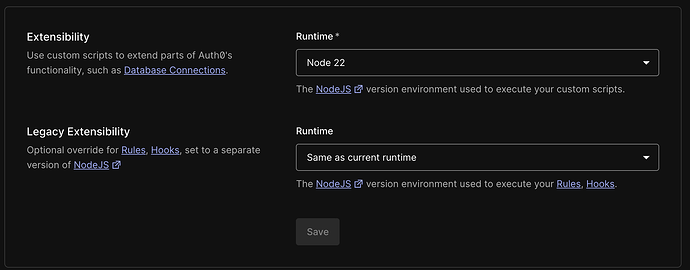Overview
This article explains what sandbox_version represents within a system or environment and discusses its importance for identifying specific environment configurations, ensuring compatibility, and troubleshooting version-related issues.
Applies To
- Update Tenant Settings
- Extensibility
Cause
Solution
The Node.js runtime for an Extensibility environment is controlled by the sandbox_version parameter. This parameter accepts various Node.js version values, including specific major versions.
There are two primary ways to configure this setting:
- Using the Auth0 Dashboard: The
sandbox_versionproperty is directly mapped to the “Runtime” setting within the Auth0 Dashboard.- In the Auth0 Dashboard, select Tenant Settings > Advanced
- To change the Node.js runtime, navigate to this section in the Auth0 Dashboard and select the desired version from the “Runtime” dropdown.
- Using the Management API: The
sandbox_versionproperty can also configure thesandbox_versionparameter programmatically by interacting with the Management API, making a PUT or PATCH request to the tenant settings endpoint.- Endpoint:
Get tenant settings(Note: While the feedback mentions GET, to set the value, performing a PUT or PATCH request to a similar endpoint, typically/api/v2/tenants/settings. Please refer to the latest Auth0 Management API documentation for the exact PUT/PATCH endpoint and payload structure for tenant settings.)When making the API request, include thesandbox_versionparameter in your request body with the desired Node.js version.
- Endpoint:
Important Considerations:
- Always ensure the chosen Node.js version is compatible with the tenant extensions.
- Thoroughly test extensions after any changes to the Node.js runtime to ensure proper functionality.
